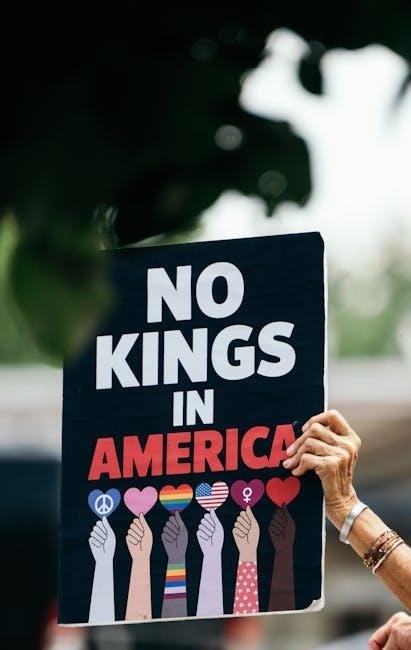America’s cultural transformation, marked by a shift toward meanness, has profound implications for social interactions and collective well-being, prompting an urgent exploration of its underlying causes.

Overview of the Topic
The cultural shift toward meanness in America is a complex phenomenon rooted in declining moral education, rising individualism, and the erosion of empathy. Historical changes, such as the 1960s cultural revolution and the 1980s emphasis on materialism, laid the groundwork for a society increasingly focused on self-interest. The normalization of rudeness in public discourse, amplified by media and political polarization, has further entrenched hostile behavior. This transformation reflects a broader societal change, with significant implications for social cohesion and collective well-being, prompting urgent reflection on how to address and reverse these trends.
Significance of Understanding America’s Shift Toward Meanness
Examining America’s shift toward meanness is crucial for understanding its societal implications. This cultural transformation affects interpersonal relationships, community trust, and collective well-being. By identifying root causes such as declining moral education, political polarization, and media influence, society can address these issues. Understanding this shift provides insights into fostering empathy and rebuilding social cohesion. It also highlights the need for systemic changes in education and public discourse to promote kindness and reduce hostility, ultimately aiming to create a more compassionate and unified society;
Historical Context of America’s Cultural Transformation
America’s cultural transformation began with the 1960s social upheaval, followed by the 1980s rise of individualism and materialism, setting the stage for a meaner society.
The 1960s Cultural Revolution and Its Impact on Social Norms
The 1960s cultural revolution reshaped America’s social fabric, emphasizing individual freedom and challenging traditional values. This era marked a shift away from collective well-being, fostering a more self-centered society. The decline of moral education and the rise of rudeness became evident as social norms evolved. The era’s focus on personal liberation eroded shared moral frameworks, leading to a fragmentation of societal cohesion. This transformation laid the groundwork for a culture where empathy and respect gave way to division and hostility, setting the stage for America’s growing meanness.
The 1980s: The Rise of Individualism and Materialism
The 1980s saw a surge in individualism and materialism, reshaping American values and behavior. This era celebrated personal success, wealth, and consumerism, often at the expense of community and empathy. The emphasis on self-reliance and economic ambition eroded collective responsibility, fostering a culture where success was measured by material gain. This shift reinforced competitive behavior and diminished the importance of social welfare, contributing to a society increasingly focused on individual achievement rather than shared well-being, further fueling the rise of meanness in American culture and interactions.

Cultural Shifts Contributing to Meanness
America’s cultural shifts, including declining moral education and the normalization of rudeness, have fostered a society where meanness is increasingly accepted and replicated across generations.
The Decline of Moral Education in Schools
The decline of moral education in schools has significantly contributed to America’s shift toward meanness. Once a cornerstone of education, moral instruction has faded, replaced by academic achievement. This shift, beginning in the 1960s, has left generations lacking empathy and social skills. Schools now prioritize test scores over character development, creating a void in moral guidance. Without formal instruction, many young people struggle to understand and practice kindness, respect, and compassion. This absence of moral education has fostered a culture where meanness often goes unchecked, perpetuating a cycle of rudeness and hostility across society.
The Normalization of Rudeness in Public Discourse
The normalization of rudeness in public discourse has become a defining feature of America’s cultural shift toward meanness. Reality TV, social media, and polarized politics have amplified aggressive behavior, making it seem acceptable. Public figures often model disrespectful communication, while platforms reward provocative content with attention. This erosion of civil discourse has seeped into everyday interactions, fostering a culture where rudeness is no longer condemned but embraced. The decline of empathy and the rise of self-interest have further entrenched this trend, leaving many questioning the loss of kindness and respect in public life.

The Role of Politics in Shaping a Mean-Spirited Culture
Political polarization and divisive rhetoric have fueled America’s cultural shift toward meanness, as aggressive speech and actions by leaders normalize hostility and erode empathy in society.
How Political Polarization Fosters Division and Hostility
Political polarization has deeply entrenched division in American society, as extreme partisanship fosters an “us versus them” mentality. This polarization, amplified by media and rhetoric, normalizes hostility and dehumanizes opponents. The erosion of civil discourse and the rise of aggressive rhetoric contribute to a culture where empathy is replaced by contempt. Such division not only fuels personal conflicts but also undermines collective efforts to address societal challenges, creating a cycle of mistrust and resentment that perpetuates meanness on a national scale.
The Influence of Media and Politicians on Public Behavior
Media and politicians significantly shape public behavior by amplifying divisive rhetoric and normalizing aggressive conduct. Reality TV, social media, and news outlets often prioritize sensationalism over civility, encouraging viewers to emulate confrontational behaviors. Politicians frequently employ inflammatory language to mobilize support, setting a tone that justifies hostility toward opponents. This cycle of provocation and reaction fosters a culture where meanness is not only accepted but also rewarded, leading to widespread erosion of empathy and respect in public discourse and individual interactions.

The Impact of Economic Inequality
Economic inequality fuels social tensions, as financial struggles create an environment where competition and self-interest often overshadow empathy, contributing to a culture of meanness and division.
How Financial Struggles Contribute to Social Tensions
Financial struggles exacerbate social tensions by fostering an environment of scarcity and competition. When resources are limited, individuals often prioritize self-interest over collective well-being, leading to increased conflict and reduced empathy. Economic inequality creates divisions, as those struggling financially may feel resentful of others perceived as more fortunate. This resentment can manifest as meanness, further eroding social cohesion. The stress of financial instability also heightens anxiety, making people more prone to frustration and hostility. Thus, economic hardship acts as a catalyst for a culture of division and meanness, undermining efforts to build a more compassionate society.
The Role of Capitalism in Encouraging Competitive Behavior
Capitalism, by its nature, emphasizes competition and individual success, often at the expense of others. This system fosters a “win-at-all-costs” mentality, encouraging aggressive behavior to achieve financial and social advancement. The pursuit of profit and status can overshadow empathy and cooperation, leading to a culture where meanness is normalized. Social media and reality TV further amplify this by celebrating cutthroat tactics, making them seem acceptable. As a result, capitalism’s focus on individual gain contributes to a society where kindness is undervalued, and meanness thrives as a tool for personal advancement.

The Decline of Community and Social Cohesion
Urbanization and suburbanization weakened community bonds, while technology isolated individuals, fostering a culture where meanness thrived due to declining face-to-face connections and shared responsibilities.
How Urbanization and Suburbanization Eroded Community Bonds
Urbanization and suburbanization reshaped America’s social fabric, leading to fragmented neighborhoods and reduced civic engagement. As people moved to cities and suburbs, traditional community ties weakened. The rise of individualistic lifestyles and reliance on technology for communication diminished face-to-face interactions, fostering isolation. Suburban sprawl further disconnected residents, prioritizing convenience over communal spaces. This shift eroded collective responsibility and empathy, contributing to a culture of meanness. The loss of shared public spaces and community rituals accelerated this decline, leaving individuals less invested in their neighbors’ well-being.
The Role of Technology in Isolating Individuals
Technology has paradoxically connected and isolated Americans. Social media platforms, while linking people globally, often foster superficial interactions, replacing deep, meaningful connections. The rise of digital communication has led to reduced face-to-face engagement, diminishing empathy and understanding. Algorithms prioritize divisive content, amplifying polarization and hostility. Increased screen time has also reduced participation in community activities, further eroding social cohesion. This digital isolation contributes to a culture of meanness, as individuals interact more with curated avatars than real people, fostering a sense of disconnection and loneliness.
The Role of Education in Shaping Values
America’s education system has shifted from fostering character development to prioritizing academic achievement, contributing to a decline in empathy and moral guidance, fueling societal meanness.
How the Education System Failed to Promote Empathy
The education system’s shift from character development to academic achievement has left generations without moral guidance, fostering self-referential values. The decline of moral education began in the 1960s, as schools prioritized intellectual growth over emotional and ethical development; This shift has led to a society where empathy is often overlooked, contributing to meanness. Without structured programs teaching kindness and respect, younger generations struggle to understand and value others’ perspectives, creating a culture of indifference and hostility.
The Shift from Character Development to Academic Achievement
The education system’s focus has increasingly prioritized academic success over moral and character development. This shift, beginning in the 1960s, has led to a generation lacking in empathy and ethical awareness. Schools once emphasized values like kindness and respect, but these have been overshadowed by standardized testing and academic rigor. As a result, many young people struggle to navigate social interactions with compassion, contributing to a culture of meanness and self-interest. This trend reflects a broader societal devaluation of moral education, leaving individuals ill-equipped to navigate complexities of human relationships.
The Rise of Narcissism and Self-Interest
America’s cultural shift toward narcissism and self-interest has eroded empathy, fostering a society where individual success is celebrated over collective well-being and kindness.
How Social Media Amplifies Narcissistic Tendencies
Social media platforms have become breeding grounds for narcissism, as users curate highlight reels of their lives, fostering self-obsession and validation through likes and followers. The constant need for digital approval encourages self-centered behavior, diminishing empathy and genuine human connection. Algorithms prioritize sensational content, amplifying aggressive or provocative posts that garner immediate reactions. This digital culture of competition and vanity has led to a society where individual success is often measured by online recognition, further eroding kindness and fostering a mean-spirited environment. The rise of narcissism is deeply intertwined with the proliferation of social media, creating a cycle of self-interest and isolation.
The Cultural Celebrations of Individual Success Over Collective Well-being
America’s cultural narrative often glorifies individual achievement, prioritizing personal success over communal well-being. This shift has fostered a society where self-interest dominates, eroding empathy and shared responsibility. Media and entertainment frequently celebrate lone heroes and entrepreneurial triumphs, reinforcing the idea that individual accomplishments define worth. Meanwhile, collective efforts and altruism are often overlooked, leading to a disconnect from societal needs. This cultural emphasis on personal gain has contributed to a mean-spirited environment, where success is measured by individual milestones rather than the betterment of the community, further isolating individuals and weakening social bonds.

The Influence of Media and Entertainment
Reality TV and social media platforms often normalize aggressive behavior, promoting narcissistic tendencies and fostering a culture of self-interest over empathy and kindness.
How Reality TV and Social Media Normalize Aggressive Behavior
Reality TV often glorifies conflict and competition, while social media platforms amplify narcissistic tendencies, creating a culture where aggressive behavior is celebrated and emulated. Shows like Survivor or The Bachelor thrive on drama, teaching viewers that success often requires ruthlessness. Similarly, platforms like Instagram and TikTok prioritize self-promotion, fostering a climate of comparison and one-upmanship. This constant exposure desensitizes individuals to meanness, making it seem normal and even desirable. Over time, these media influences reshape societal norms, encouraging a culture of self-interest and hostility over empathy and cooperation.
The Role of News Media in Amplifying Conflict
News media often prioritizes sensationalism over balanced reporting, amplifying conflicts and fostering division. By focusing on extreme views and polarizing narratives, outlets create an “us versus them” mentality. This approach increases ratings but erodes civil discourse. The 24-hour news cycle and social media algorithms further exacerbate this, spreading hostility and normalizing aggressive rhetoric. Over time, this constant exposure to conflict desensitizes the public, contributing to a mean-spirited culture where empathy is overshadowed by antagonism. Media’s role in shaping perceptions thus plays a significant part in America’s cultural shift toward meanness.

The Role of Mental Health in Shaping Behavior
Stress and anxiety have become pervasive, contributing to increased irritability and meanness. Limited access to mental health resources exacerbates these issues, fostering a culture of emotional strain.
How Stress and Anxiety Contribute to Meanness
Chronic stress and anxiety have become pervasive in American society, leading to increased irritability and reduced empathy. When individuals are under significant emotional strain, they are more likely to exhibit hostile behavior. This emotional overload often results in snap reactions, harsh words, and a lack of patience. Furthermore, stress can impair judgment, making people more prone to aggressive or mean-spirited actions. The societal pressure to succeed, coupled with economic uncertainty, amplifies these feelings, creating a culture where stress and anxiety fuel meanness. This cycle is further exacerbated by the lack of accessible mental health resources to address these underlying issues.
The Lack of Access to Mental Health Resources
The scarcity of accessible mental health resources exacerbates stress and anxiety, contributing to a rise in meanness. Many individuals struggle with untreated mental health issues due to financial barriers, stigma, or limited availability of care. This lack of support perpetuates cycles of frustration and hostility, as people may act out due to unaddressed emotional pain. The normalization of aggressive behavior in a society lacking mental health infrastructure further entrenches meanness. Addressing this gap is essential to fostering empathy and kindness, as untreated mental health struggles often manifest as societal discord and interpersonal cruelty.

Possible Solutions to the Problem
Rebuilding moral education, fostering empathy, and promoting community engagement are critical steps to counteract meanness, requiring collective effort and systemic change to restore kindness and unity.
Rebuilding Moral Education in Schools
Reviving moral education in schools is essential to address the decline of empathy and kindness. By incorporating character development programs, schools can nurture values like respect and compassion. Teaching critical thinking and ethical decision-making helps students understand the impact of their actions. Integrating real-world examples and community service can make these lessons practical. Encouraging open discussions about morality fosters a supportive environment where students feel safe exploring complex issues. This approach not only shapes individual behavior but also builds a more empathetic society, countering the growing meanness in American culture. It requires commitment from educators, parents, and policymakers to ensure its success and lasting impact.
Encouraging Community Engagement and Empathy
Fostering community engagement and empathy is crucial to combating meanness. Local initiatives, such as volunteer programs and neighborhood events, can strengthen social bonds. Encouraging active listening and open dialogue helps bridge divides. Schools and organizations should promote empathy-building activities, like storytelling and perspective-sharing. By creating spaces where people connect on a personal level, we can cultivate compassion and understanding. This collective effort to prioritize empathy over indifference is vital for rebuilding a kinder, more unified society. It requires active participation from individuals, communities, and institutions to create meaningful change and reverse the trend of meanness.

Case Studies and Examples
Examples from How America Got Mean highlight historical shifts in behavior, while international comparisons reveal alternative approaches to balancing individualism with kindness, offering valuable insights.
How Other Countries Maintain a Balance Between Individualism and Kindness
Nations like Sweden and Canada emphasize community values alongside individual success, fostering empathy through education and social policies. These countries prioritize collective well-being without sacrificing personal freedoms, creating a harmonious society that values both independence and kindness. Their approaches offer a blueprint for addressing America’s cultural shift toward meanness by integrating moral education and promoting social cohesion. By studying these models, insights can be gained into rebuilding a culture that balances individualism with compassion and mutual respect, essential for a healthier societal framework.
Historical Examples of Cultural Shifts Toward Kindness
Throughout history, societies have undergone shifts toward kindness, often driven by movements advocating for compassion and equality. For instance, the abolitionist movement in 19th-century America fought to end slavery, emphasizing moral values and human dignity. Similarly, the Progressive Era promoted social welfare and workers’ rights, reflecting a societal turn toward empathy. These examples demonstrate how collective efforts can foster a culture of kindness, contrasting with America’s current mean-spirited trends. Such historical shifts highlight the potential for societal transformation when empathy and moral values are prioritized.
America’s shift toward meanness reflects a complex interplay of moral decay, societal influences, and cultural erosion. Rebuilding empathy and kindness requires collective effort and renewed moral focus.
Recap of Key Factors Leading to America’s Mean-Spirited Culture
America’s cultural shift toward meanness stems from declining moral education, societal normalization of rudeness, and the erosion of community bonds. The rise of individualism, fueled by the 1980s’ focus on materialism, has fostered self-interest over collective well-being. Reality TV and social media have amplified aggressive behavior, making it socially acceptable. Additionally, urbanization and suburbanization have weakened community ties, while capitalism has encouraged competitive, often cutthroat, behavior. These factors, combined with a lack of empathy in public discourse, have created a culture where meanness prevails, highlighting the need for systemic change to restore kindness and unity.
A Call to Action for Rebuilding a Kinder Society
Rebuilding a kinder America requires collective effort and systemic change. Reviving moral education in schools and fostering empathy through community engagement are essential steps. Encouraging media to promote positive narratives and holding leaders accountable for civil discourse can shift cultural norms. Individuals must prioritize kindness in daily interactions, while policymakers should address economic inequalities and mental health access. By uniting across divides and valuing collective well-being, society can move toward a future where meanness is replaced with compassion, empathy, and unity, ensuring a brighter, more harmonious tomorrow for all Americans.
